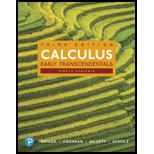
Logistic equations Consider the following logistic equations, for t ≥ 0. In each case, sketch the direction field, draw the solution curve for each initial condition, and find the equilibrium solutions. A detailed direction field is not needed. Assume t ≥ 0 and P ≥ 0.
22.
Want to see the full answer?
Check out a sample textbook solution
Chapter 9 Solutions
Calculus, Single Variable: Early Transcendentals (3rd Edition)
- the correct answer is C could you please explainarrow_forwardWhich of the functions shown below is differentiable at z = 2? Select the correct answer below: о -7-6-5-4-3-2- −7 −6 −5 −4 −3-2 1 2 4 5 6 -7-6-5-4-3-2- -7-6-5-4-3 2 45arrow_forwardQuestion Given the graph of f(z) below, find the graph of the derivative of f(z). Select the correct answer below: ° ° 129 -7-6-5-4-3-2 -7-6-5-4-3-2-1123456 ° ° °arrow_forward
- Question Find the open interval(s) of f(x), graph given below, where f'(x) is negative. -3-2-1 1 2 4 5 6 Give your answer in interval notation. For example, (2, 4) U (6,∞). Provide your answer below:arrow_forwardthe correct answer is Ccould you please show me how to do it using the residue theoremarrow_forwardUse the information to find and compare Δy and dy. (Round your answers to four decimal places.) y = x4 + 7 x = −3 Δx = dx = 0.01 Δy = dy =arrow_forward
 Glencoe Algebra 1, Student Edition, 9780079039897...AlgebraISBN:9780079039897Author:CarterPublisher:McGraw HillAlgebra & Trigonometry with Analytic GeometryAlgebraISBN:9781133382119Author:SwokowskiPublisher:Cengage
Glencoe Algebra 1, Student Edition, 9780079039897...AlgebraISBN:9780079039897Author:CarterPublisher:McGraw HillAlgebra & Trigonometry with Analytic GeometryAlgebraISBN:9781133382119Author:SwokowskiPublisher:Cengage Functions and Change: A Modeling Approach to Coll...AlgebraISBN:9781337111348Author:Bruce Crauder, Benny Evans, Alan NoellPublisher:Cengage Learning
Functions and Change: A Modeling Approach to Coll...AlgebraISBN:9781337111348Author:Bruce Crauder, Benny Evans, Alan NoellPublisher:Cengage Learning
 Trigonometry (MindTap Course List)TrigonometryISBN:9781337278461Author:Ron LarsonPublisher:Cengage Learning
Trigonometry (MindTap Course List)TrigonometryISBN:9781337278461Author:Ron LarsonPublisher:Cengage Learning





